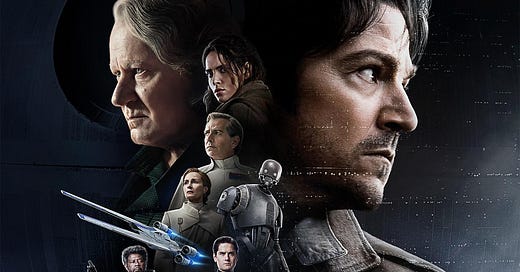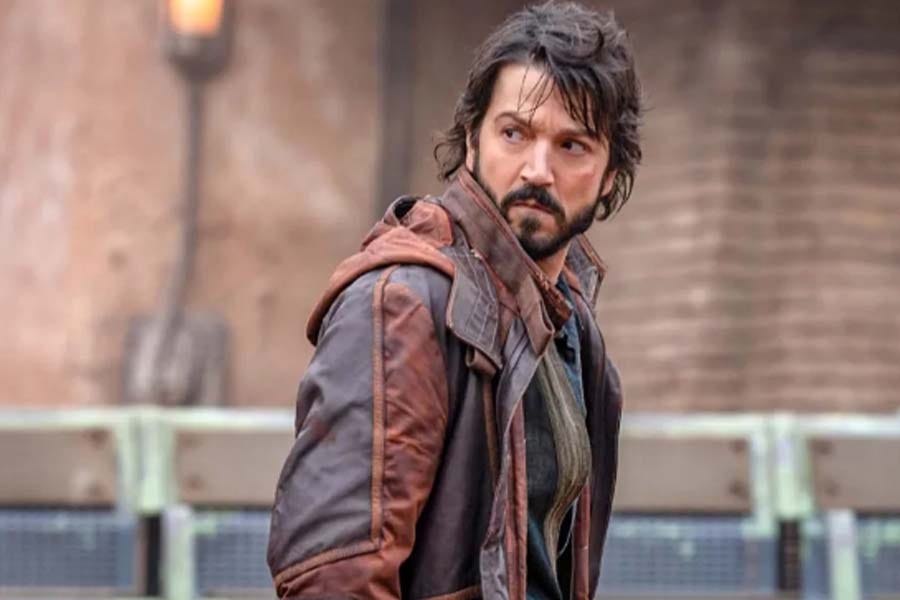Finding light in a dark galaxy far, far away
How I learned to stop hating dark Star Wars and love what it's showing us
A year ago, I wrote about how I’d come to love Rogue One: A Star Wars Story, a movie I initially despised for its unrelenting grimness. Its gritty tone clashed with my deep affection for the hopeful, swashbuckling spirit of the original Star Wars trilogy. Yet, something shifted in me after I watched Rogue One a second time—I now consider it one of the great Star Wars movies.
My husband and I are watching the Disney+ series Andor, a prequel to Rogue One, despite a friend’s warning to steer clear. He knows I don’t like entertainment with overly dark themes. But I watched it anyway, and instead of resisting the series’ bleakness, I’ve decided to lean into it.
Andor and Rogue One have taught me to appreciate the purpose of “overly dark” storytelling, even in the fantastical Star Wars universe. The original trilogy, which I adore beyond reason, never fully showed the cost of rebelling against an evil empire. Yes, we witnessed the destruction of Alderaan in A New Hope, a planet obliterated in seconds by the Death Star. But after Obi-Wan Kenobi’s brief moment of grief, the story swept forward, focusing on Luke Skywalker’s journey and his father’s redemption. That focus was intentional and it’s what made the original trilogy great, but it left the Empire’s true evil somewhat abstract—a backdrop of stormtroopers, starships, and Darth Vader’s theatrical villainy.
Andor and Rogue One peel back that curtain, revealing the Empire’s cruelty in a visceral, ground-level way. Andor immerses us in a galaxy of oppressive bureaucracy, where ordinary people are crushed under the weight of surveillance, exploitation, and despair. The show’s protagonist, Cassian Andor, navigates a world where hope feels like a luxury, and rebellion seems futile. The Empire’s evil isn’t just in planet-destroying super-weapons; it’s in the quiet, soul-crushing machinery of control—faceless officers, prison labor camps, and communities stripped of dignity. This dreariness is horrifying, and it makes the Rebellion’s existence almost miraculous. As Andor and Rogue One show, resisting evil exacts a profound personal and societal toll. Few are willing to pay it until the pain of enduring evil outweighs the fear of fighting back. This, I’ve realized, is one reason evil persists, both in fiction and in our world.
Cassian Andor himself embodies this struggle in a deeply human way. Traumatized by a childhood marked by loss and shaped by a life of scraping by in the Empire’s margins, he’s no idealized hero. He’s flawed—cynical, morally compromised, and haunted by his past. Yet, through Andor and Rogue One, we see him slowly awaken to a cause greater than himself, culminating in his ultimate sacrifice to secure the Death Star plans. His journey mirrors how God, throughout the Bible, chooses imperfect people for divine purposes. From Moses, a murderer with a speech impediment, to David, an adulterer and king, God transforms broken vessels into instruments of His will. Cassian’s flawed yet redemptive arc reminds me that God doesn’t require perfection—just willingness to act for the good, trusting the outcome to Him.
If Rogue One and Andor were dark for darkness’s sake, I wouldn’t bother with them. But their stories unfold with the original trilogy’s triumph in view. We know the Death Stars are destroyed, the Empire falls, and Darth Vader finds redemption. This context transforms their grimness into something redemptive. The sacrifices in Rogue One—where every major character gives their life for the Rebellion—are not in vain. The despair in Andor is the darkness before the dawn, a prelude to the joy of victory. These characters don’t know the outcome, but we do, and that knowledge imbues their struggles with profound meaning.
This dynamic resonates deeply with my Christian faith. The book of Hebrews speaks of a “great cloud of witnesses” who are watching as Christians endure hardship for a promised joy they couldn’t yet see:
Therefore, since we are surrounded by so great a cloud of witnesses, let us also lay aside every weight, and sin which clings so closely, and let us run with endurance the race that is set before us, looking to Jesus, the founder and perfecter of our faith, who for the joy that was set before him endured the cross, despising the shame, and is seated at the right hand of the throne of God. —Hebrews 12:1-2
Like the rebels in Rogue One and Andor, Christians live in a world shadowed by evil—not merely political or social, but spiritual. The apostle Paul describes this struggle vividly:
For we do not wrestle against flesh and blood, but against the rulers, against the authorities, against the cosmic powers over this present darkness, against the spiritual forces of evil in the heavenly places. —Ephesians 6:12
Yet, we’re not just characters in this story; we’re also its audience, privy to the ending. We know Jesus’ sacrifice on the cross defeated death. We know His resurrection and ascension secured victory over evil. The book of Revelation assures us that Christ will return to make all things new. The empire of darkness is already defeated, even if its shadows linger. Our role is to play our parts—however small—until the final act unfolds.
Rogue One and Andor have become more than entertainment for me. They mirror the Christian life, illuminating both the cost of resisting evil and the joy of knowing the battle is won. They remind me that even in a world of pain, our sacrifices, like those of Cassian Andor or Jyn Erso, are not meaningless. They are part of a larger story, one that ends in glory. And that makes the darkness of this new, grittier Star Wars not just bearable, but beautiful.
Related: Star Wars keeps reminding me that creation is good
Liked this article? Share it with a friend who’d enjoy the science-and-faith conversation. If you’re a free subscriber who would like to support my work, you can upgrade to a paid subscription (which comes with some perks).







“In him was life, and that life was the light of all mankind. The light shines in the darkness, and the darkness has not overcome it.”
John 1:4-5 NIV